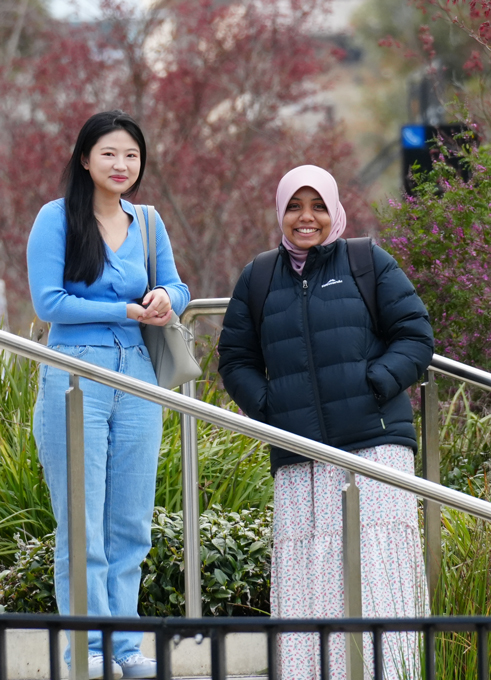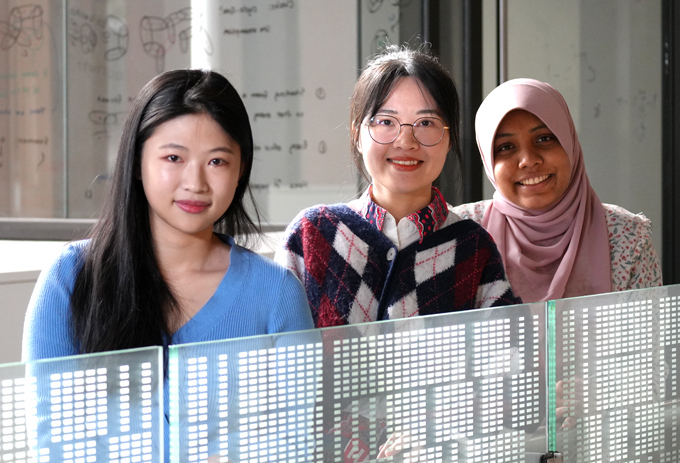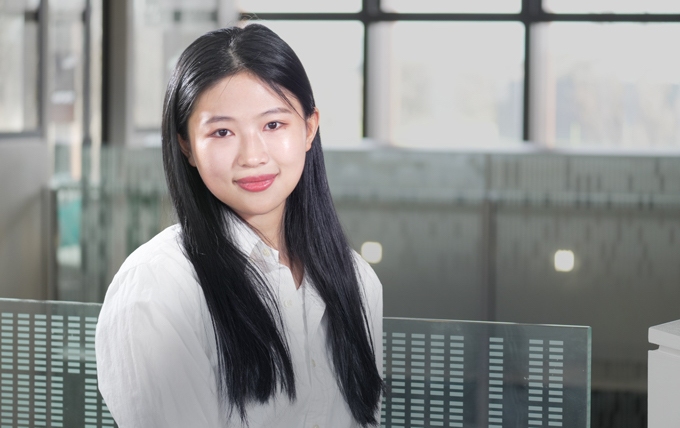Chunyi Sun skipped a year of school during her youth in Nanjing, China and had started university a year early when a surprising swerve in her study interests led her to The Australian National University (ANU).
Five years later, she is one of two inaugural recipients of the prestigious Pioneering Women Scholarship and embarking on her PhD research at the ANU School of Computing.
“My goal is to combine large language models with 3D models by allowing them to share a common feature space, thus achieving zero-shot 3D generation,” she said.
 The Pioneering Women Program
(PWP)
is designed to address the underrepresentation of women in computing,
which limits the diversity of ideas and the efficacy of approaches in
a field of increasing reach and importance.
The Pioneering Women Program
(PWP)
is designed to address the underrepresentation of women in computing,
which limits the diversity of ideas and the efficacy of approaches in
a field of increasing reach and importance.
“Chunyi has been an outstanding undergraduate student and Honours researcher these past five years, and we are thrilled to keep her with us for her PhD,” saidProfessor Amanda Barnard, AM FRSC FAIP, who chairs the program.
The PWP, which also offers grant funding for lecturers, is accepting applications for its second round of fundingthrough 6 November 2023.
A change of heart at the Central Academy
In many countries, students enter university having chosen general areas of study, but do not select a major until the end of their second year. In China, students are essentially locked into majors chosen during the entrance exam and admission process. Ms Sun was 16 years old at that time.
Ms Sun’s parents are both successful artists. They encouraged their daughter to follow in their footsteps and she wanted to please them. So, she applied to and was accepted into the renowned Central Academy of Fine Arts in Beijing.
After a semester, she realised she had made a mistake. She had always been interested in robotics and wanted to study computing and engineering instead.
However, the university system in China allows only the highest ranked students in one major to switch to another.
“Rising to the top of my class was an impossibility, because I was not inspired by design,” Ms Sun said.
If she truly wanted to alter the course of her education, she would need to leave China and study abroad.
She researched universities in Australia and applied to ANU, in part because of the integration of computing and engineering within the ANU College of Engineering, Computing & Cybernetics (CECC). She loved the idea of studying both subjects for a time and narrowing her discipline focus later.
She pursued an engineering and computing double major until an introductory computing course captured her imagination.
“I became fascinated by machine learning and computer vision in the first semester of my second year,” Ms Sun recalled. “It was a significant milestone in my academic journey.”
Soon, she had devoured each of the six machine learning courses available at ANU.
“Through enrolling in ENGN8501 (Advanced Topics in Computer Vision), I encountered the most state-of-the-art research on computer vision,” she said.
And when that was not enough, she took an online course called ‘Deep Learning for Computer Vision’, offered by Stanford University, in addition to her ANU courses.
Self-directed study continues despite pandemic
When the global pandemic prevented her from returning to Australia for her third year, Ms Sun reduced her course load at ANU, which was offered remotely, and sought out in-person learning opportunities closer to home.
“I joined City University of Hong Kong for a research internship, where I had the privilege of working on exciting projects that further ignited my passion for computer science,” Ms Sun said.
During the same period, she joined the Blind Image Decomposition (BIDeN) (2) project at ANU.
“We proposed a new task that requires separating a superimposed image into constituent underlying images in a blind setting. We also constructed three benchmark datasets and a strong baseline model,” she said.
Both the Hong Kong and the ANU research focused on deep learning and image editing tasks in computer vision, and both were published in European Conference on Computer Vision (ECCV) 2022.
When she returned to Australia, it was time to begin her Honours research project.
“I had become interested in 3D tasks,” she said. “I had noticed the large gap between 3D editing and 2D editing, and so I started exploring the most effective methods to grant high controllability to 3D editing.”
Mentor in the making
Ms Sun said the Pioneering Women Scholarship (A$10,000 for up to four years) will accelerate her research progress and allow her to provide more research opportunities for undergraduates at ANU.
“While I may not consider myself a traditional role model, I do hope that my journey in computer science can inspire and empower other young women to pursue their interests in technology,” she said.
During her undergraduate days, while working as a tutor at the School of Computing, she supported and mentored women in their computer science endeavours. She envisions similar relationships developing as she invites undergraduates to work with her on her PhD research.
“I have always strived to provide guidance, share my experiences, and offer advice whenever possible,” she said.
Ms Sun’s PhD research will focus on the communication interface between humans and artificial intelligence in the facilitation of 3D modelling.
 “I would
like to continue to explore 3D scene editing,” she said. “I aim to
achieve highly controllable and interactable 3D generation to enhance
multimedia experiences and also make large contributions to the entire
computer vision area.”
“I would
like to continue to explore 3D scene editing,” she said. “I aim to
achieve highly controllable and interactable 3D generation to enhance
multimedia experiences and also make large contributions to the entire
computer vision area.”
She intends to contribute to the enhancement of unsupervised feature learners and training data synthesisers for 3D tasks such as segmentation and recognition.
“I also hope to overcome bottleneck problems of the 2D generative model, such as relighting, object relation modelling, and motion prediction,” she said.
———
Sumayya Ziyad is the other PWP scholar, and Dr Xiaoyu Sun is the first PWP lecturer.
Computing pioneer aims for impact as researcher, mentor
Pioneering Women scholarship welcomes computing standout from Sri Lanka

